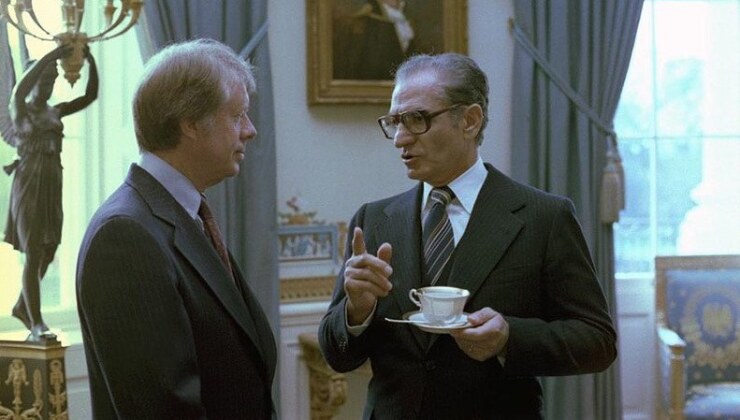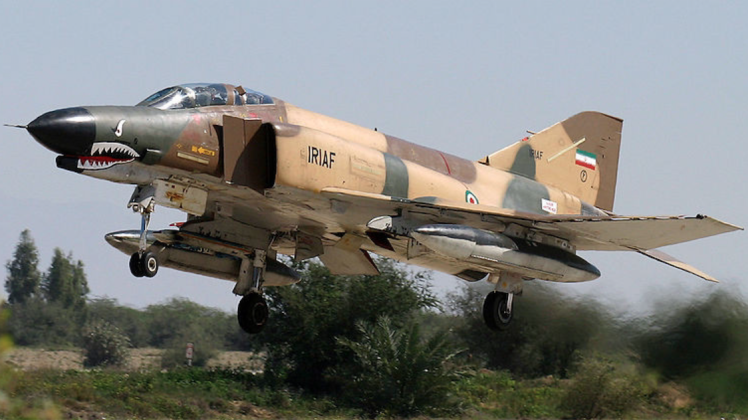The Shah's Nuclear Bomb as a Western Asset: How America Supported Iran's WMD Program

Shahab-3 Ballistic Missile
Since the mid 1980s the possibility of Iran developing a nuclear weapons capability has been a significant concern in the Western world, and one which has only grown with time as the country's economy and defence sector have modernised and as it acquired a growing number of potentially nuclear capable North Korean missile designs.
Since the mid 1980s the possibility of Iran developing a nuclear weapons capability has been a significant concern in the Western world, and one which has only grown with time as the country's economy and defence sector have modernised and as it acquired a growing number of potentially nuclear capable North Korean missile designs.
Allegations of a nuclear weapons program have served as a key pretext for a range of hostile policies towards Tehran including threats of war, preparations for potential preventative strikes on Iranian nuclear facilities, economic sanctions, and application of immense pressure and the United Nations to push for an international response in line with Western interests.
With Pakistan and North Korea having both withstood considerable Western pressure to develop nuclear arsenals in the 1990s, and North Korea doing so despite by far the harshest UN sanctions in world history being applied to it, Iran has long been speculated to become the world’s 10th nuclear weapons state despite officially denying aspirations to develop such armaments.


Iranian Khorramshahr Potentially Nuclear Capable Missiles
The drafting of the Joint Comprehensive Plan of Action (JCPOA) nuclear deal in 2015, which removed UN sanctions on Iran but allowed unilateral Western sanctions to remain while imposing restrictions on the country's nuclear activities, forestalled Iran’s emergence as a nuclear weapons state. With the Obama administration having announced America’s ‘Pivot to Asia,’ under which the U.S. would concentrate its efforts and refocus its military towards the Asia-Pacific and away from the Middle East involving the U.S. military in a major and likely protracted war in the Persian Gulf to stop the Iranian nuclear program appeared highly undesirable.
The drafting of the Joint Comprehensive Plan of Action (JCPOA) nuclear deal in 2015, which removed UN sanctions on Iran but allowed unilateral Western sanctions to remain while imposing restrictions on the country's nuclear activities, forestalled Iran’s emergence as a nuclear weapons state. With the Obama administration having announced America’s ‘Pivot to Asia,’ under which the U.S. would concentrate its efforts and refocus its military towards the Asia-Pacific and away from the Middle East involving the U.S. military in a major and likely protracted war in the Persian Gulf to stop the Iranian nuclear program appeared highly undesirable.
Withdrawal from the JCPOA by the Trump administration, in light of an apparent refocusing towards the Middle East and a need to maintain the security of Israel, a small U.S. aligned nuclear power which faced a growing Iranian sponsored military presence on its borders, did however bring the potential for conflict over the Iranian nuclear program to the forefront once again.


Mohammad Reza Pahlavi and Jimmy Carter at the White House
According to a number of Western analysts Iranian development of a nuclear weapon would allow Tehran to establish itself as a dominant military power in the Middle East as well as undermine the Israeli nuclear advantage, is an often covered subject.
According to a number of Western analysts Iranian development of a nuclear weapon would allow Tehran to establish itself as a dominant military power in the Middle East as well as undermine the Israeli nuclear advantage, is an often covered subject.
The origins of the Iranian nuclear program, however, are less widely known. Before the 1979 Iranian revolution, which saw the Western aligned Pahlavi dynasty ousted from power, Iran had been supplied with much of what it needed to develop a nuclear weapon by the United States with full knowledge of what the nuclear materials could be used for. Assistance escalated in 1974, and a CIA proliferation assessment that year stated that there was "no doubt" that Tehran would use this assistance to develop a nuclear arsenal by the mid 1980s.
Iranian ruler Mohammad Reza Shah himself stated that Iran would become a nuclear power "without a doubt and sooner than one would think." The United States was knowingly supporting the proliferation of nuclear weapons to the Middle Eastern state, but as the development was set to strengthen the Western bloc’s position rather than undermine it it was perceived as an asset rather than being portrayed as an existential threat to international security.
With Israel at the time having already developed a nuclear arsenal, the Western bloc was to have two nuclear armed clients in the Middle East - a monopoly which would leave Soviet aligned regional powers such as Syria and Iraq at a severe disadvantage. With Iran also bordering the USSR, an Iranian nuclear arsenal pointed into the USSR from the south would further stretch the superpower's resources.


Iranian Air Force F-4 Phantom - designed to be capable of nuclear weapons delivery
Nuclear assistance to Iran was carried out under the Atoms for Peace initiative, under which the United States provided a number of valuable strategic partners with facilities to produce nuclear energy which helped to win over these nations in light of the growing competition for influence with the Soviet Union.
Nuclear assistance to Iran was carried out under the Atoms for Peace initiative, under which the United States provided a number of valuable strategic partners with facilities to produce nuclear energy which helped to win over these nations in light of the growing competition for influence with the Soviet Union.
With Iran bordering the USSR, its overwhelmingly pro Western leadership including the European educated Shah provided the United States with valuable military facilities on the Soviet border, while the military was a leading client for Western arms which were pointed squarely at the Soviet Union. A nuclear armed Iran would cause further security concerns for the USSR, far more so than a nuclear armed North Korea has for the United States today considering the distance between them, and much of the infrastructure the United States provided Tehran could be used to produce plutonium and weapons grade uranium, the two critical materials needed to make nuclear warheads.
Israel was also reportedly supportive of the Iranian nuclear program, which would provide its primary regional ally with capabilities to better combat their common enemies in the region.
With foreign assistance cut off after 1979, and Iran being slow to form ties with the USSR, the country would be forced to rely on its own capabilities and on North Korean support to subsequently develop its nuclear industry.
"Military Watch" , which is a Russian-backed site is just Bullshiting 50-year old Grandmother stories.
ReplyDeleteThe Shah had no nuclear bomb program, just an attempt to build a nuclear reactor.
The entire infrastructure of Uranium enrichment centrifuge equipment "calutrons" as they are known, the massive uranium hexaflouride gassification process, is the work of the Islamic Republic of Iran, to build an "Allah Bomb" , principal target being the destruction of Israel.
Wakakakakaka…
DeleteAin't u the one that farts about xxx fanboys dying support their idealism - especially vis-a-vis the mouthpiece reporting?
What say u know?
Mfering hypocrite, no?